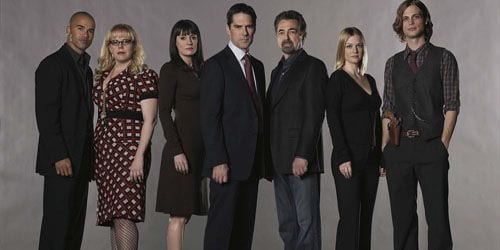
The schizophrenic sixth season of Criminal Minds ended with the sort of cliffhanger that would move only a longtime fan: JJ (AJ Cook) revealed that she was returning to the FBI’s elite Behavioral Analysis Unit after being unceremoniously shuffled off to the Department of Defense earlier in the year. And, sure enough, “It Takes a Village,” the seventh season premiere of CBS’ often absurd hit procedural, begins with JJ as well.
She is the first team member to testify before a secret Senate committee convened to consider punishment in the wake of the BAU’s latest spectacular series of breaches of agency protocol, government policy, and international law. Presided over by Senator Cramer (Mark Moses), these hearings activate a series of flashbacks that narrativize the return of the BAU’s other resident profiling babe, Emily Prentiss (Paget Brewster). Believed by most of the team members to have been killed by her nemesis (and former lover), the Moriartyesque Ian Doyle (Timothy V. Murphy), Prentiss had actually survived and been whisked away into hiding overseas. But now the net is tightening around Doyle, and the time is ideal for her triumphant return.
As exits go, Prentiss’ was the most overwrought in the history of the series. The agent she replaced, Elle (Lola Glaudini), killed a perp and resigned soon after, while former team leader Jason Gideon (Mandy Patinkin) packed up his instability and his guilt and vanished, taking the role of protagonist with him. Since then, Criminal Minds has been an ensemble piece, focusing more on collaborative crime-solving than the alpha-male hero (as in, say, the CSI franchise). Like all other elements of the show, this conception of the BAU as a team, and even as a “family,” is quite badly overdone, but this seems not to matter to its loyal fanbase.
The anguished outcry of this fanbase over the removal of two of this makeshift domestic unit’s “sisters” in the course of last season is a plausible explanation for its abrupt U-turn on the subject. Speculation linked the brief non-renewals of Cook’s and Brewster’s contracts to behind-the-scenes cost-cutting measures, but viewers’ strongly expressed fondness for JJ and Prentiss apparently won the day. This may be much to the chagrin of Rachel Nichols, whose now-superfluous character Agent Seaver is written out of the show via a throwaway line about reassignment (punctuated by a pluckily earnest “Good for her!” from Brewster) in the new season’s premiere. But you’ll be hard-pressed to find anyone else who misses her in the surprisingly active fan community (seriously, you haven’t lived until you’ve perused some Morgan/Reid slash fiction).
Prentiss’ return marks a valuable opportunity to slip some notes of internal tension into the g-man love — in that the BAU had become, and the series’ writers leap on it like starving dogs offered a slab of meat. In the season’s second episode, “Proof,” female fan favourite Reid (the willowy, vest-clad Matthew Gray Gubler) turns his frustrations over being lied to about Prentiss’ true fate on JJ — for, along with team leader Hotch (Thomas Gibson), she knew of the ruse and hid it from the others.
Gubler’s thespianic depiction of this umbrage mostly consists of avoiding eye contact and furrowing his brow, and reminds us that he’s perhaps the least engaging performer of this ensemble. Joining him at the back of the pack are the frenetically tacky Kirsten Vangsness and the impeccably groomed Shemar Moore as Agent Morgan. The former’s motor-mouthed enthusiasm is consistently drowned in a bathtub full of insufferable quirk, while the latter is perpetually trapped in the masculine cage of his daytime-soap emotive range.
Brewster’s return is thus especially welcome, given the borderline sarcasm of her line deliveries. Like the wearier and more subtly bitter Joe Mantegna, she seems to recognize the proceedings’ essential ridiculousness, and does her best to acknowledge that for snarking observers in the back rows. Still, Prentiss and her peers tend to be overshadowed by Hotch, a stoic leader even before the murder of his wife by his serial killer nemesis in the middle of the fifth season. Now sporting a ragged beard and looking alarmingly gaunt, he begins this season on assignment in Pakistan, an implied penance for repeatedly thumbing his nose at his superiors in the FBI. Gibson is the ideal straight man for such comedy.
One needs to hone in on the performers to find reasons to stay engaged, because the plots and premises of Criminal Minds are worn thin as filaments by this point. There are only so many psychological motivations for murder to be sussed out, only so many women and children to be placed in sensationalistic peril, only so many conservative crime-fighting fantasies to be indulged. The show’s glib circumventions of the criminal justice system, assumed to be ineffective on every American television procedural except Law & Order, now make for little more than mildly exciting amateur gambling. In our household, informal bets are regularly placed on the BAU member most likely to go off half-cocked and waste the unsub with his or her service weapon that week (Morgan is on permanent 2-1 odds).
This is all to say that complete reliance on a formula is not a guarantor of success, even for Criminal Minds. Its limp and short-lived spinoff, Suspect Behavior, proved that rather conclusively: its failure precipitated the flagship’s reconstitution of the BAU in its established form. It’s fair to ask if there is now anything to this still popular show beyond the formula. The answer is, the sameness and familiarity provide comfort. In an unpredictable world, it is heartening to know that there’s always another brutal set of serial murders waiting to be efficiently solved.

![Call for Papers: All Things Reconsidered [MUSIC] May-August 2024](https://www.popmatters.com/wp-content/uploads/2024/04/all-things-reconsidered-call-music-may-2024-720x380.jpg)



